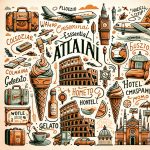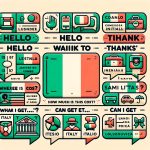When embarking on a journey to Italy, learning a few basic Italian phrases can go a long way in enhancing your travel experience. While many locals in popular tourist destinations speak English, making an effort to communicate using their language can make a positive impact on your interactions and allow you to truly immerse yourself in the local culture.
In this article, we will explore why learning Italian phrases is essential for travelers and provide you with a comprehensive guide to the most useful phrases for various aspects of your trip.
Italy is renowned for its rich history, exquisite cuisine, breathtaking landscapes, and vibrant cultural heritage. By learning some key Italian phrases before your trip, you not only show respect for the country and its people but also open doors to authentic experiences that may otherwise be inaccessible.
Whether it’s ordering traditional dishes at local restaurants, exploring hidden gems off the beaten path, or simply engaging in friendly conversations with locals, knowing a bit of the language will help bridge any communication gaps and create lasting memories.
Moreover, navigating through Italy’s bustling cities or picturesque countryside becomes much easier when armed with some common Italian expressions for getting around. From asking for directions at train stations or bus terminals to understanding transportation schedules and purchasing tickets, being familiar with basic phrases related to Italy’s public transportation system ensures smoother travels and minimizes any potential stress or confusion.
Ready to embark on this linguistic adventure? Let’s dive into the world of essential Italian phrases that will transform your travel experience.
Basic Greetings and Expressions
When traveling to Italy, it is essential to familiarize yourself with basic greetings and expressions in order to navigate conversations and show respect for the local culture. Learning a few key phrases can go a long way in making connections with locals and immersing yourself in the Italian way of life. Here are some commonly used Italian greetings and expressions that every traveler should know:
- Ciao: This versatile word can be used to say both “hello” and “goodbye.” It is a casual greeting that can be used among friends, family, or acquaintances.
- Buongiorno: Literally meaning “good day,” buongiorno is the formal way to greet someone during daytime hours. It can be used in any situation, whether you’re entering a store, greeting a new acquaintance, or addressing someone in a professional setting.
- Buonasera: Similar to buongiorno, buonasera means “good evening” and is used as a formal greeting after sunset.
- Grazie: To show gratitude or say “thank you,” use the word grazie. It is an important phrase to use when someone has helped you or provided you with something.
- Prego: In response to someone saying thank you, you can reply with prego, which means “you’re welcome.” This polite phrase is commonly used in Italy when acknowledging gratitude.
- Scusa/Scusami: When apologizing or asking for forgiveness for a mistake or misstep, say scusa (informal) or scusami (formal). These words are essential for showing respect and acknowledging your error.
- Mi dispiace: This phrase translates to “I’m sorry” and is used when expressing sympathy or regret over something that has happened.
Remember, it’s not just about mastering the pronunciation of these phrases; it’s also about using them appropriately in different social situations. By learning and using basic greetings and expressions, you can enhance your travel experience by connecting with locals and showing respect for their culture.
Getting Around
Italy has a well-developed public transportation system that makes it easy for travelers to get around and explore the country. Whether you’re taking the train, tram, bus, or subway, it’s helpful to know some common phrases to navigate Italy’s public transportation system with ease.
1. Asking for Directions:
– “Scusi, dov’è la stazione?” (Excuse me, where is the train station?)
– “Mi può dire dove si trova l’autobus?” (Could you tell me where the bus stop is?)
– “Dov’è il binario per Firenze?” (Where is the platform for Florence?)
2. Buying Tickets:
- “Vorrei un biglietto per Roma, per favore.” (I’d like a ticket to Rome, please).
- “Un biglietto di andata e ritorno per Napoli.” (A round-trip ticket to Naples).
– “Quanto costa un biglietto per Venezia?” (How much does a ticket to Venice cost?)
3. Inquiring about Timetables:
– “A che ora parte il prossimo treno per Milano?” (What time does the next train to Milan leave?)
– “Qual è l’orario del tram numero 4?” (What is the schedule for tram number 4?)
– “C’è un autobus diretto all’aeroporto?” (Is there a direct bus to the airport?)
Remember to familiarize yourself with the local currency and keep small bills or change on hand when purchasing tickets from machines or kiosks. Additionally, it’s always a good idea to validate your ticket before boarding most forms of public transportation in Italy.
Eating and Drinking
When traveling in Italy, one of the most enjoyable aspects of the experience is undoubtedly indulging in delicious Italian cuisine. Whether it’s dining at a cozy trattoria or savoring a traditional pizza in a local pizzeria, knowing some essential phrases for ordering food and beverages in Italian restaurants can greatly enhance your dining experience.
Ordering Food
To begin your culinary adventure, familiarize yourself with some key phrases for ordering food. When you’re ready to place your order, you can say “Vorrei ” which means “I would like “. For example, if you want to order spaghetti carbonara, you can say “Vorrei spaghetti alla carbonara”.
If you have dietary restrictions or preferences, it’s useful to know how to say “senza” which means “without”. For instance, if you don’t want cheese on your pasta, you can say “Senza formaggio”.
Drinks
In addition to ordering food, it’s important to know how to ask for drinks. To request water without gas, simply say “Acqua naturale”, while if you prefer sparkling water, you can ask for “Acqua frizzante”. If you’re a coffee lover and want an espresso after your meal, order a “Caffè espresso”.
For those who prefer tea, asking for a “Tè” will do the trick. If alcohol is more your style, make sure to try the famous Italian wine by requesting a glass of “vino” or enjoy a refreshing beer by asking for a “birra”.
Bill and Payment
Once you’ve enjoyed your meal and are ready to pay the bill, it’s crucial to know how to ask for it. You can simply ask the waiter or waitress by saying “Il conto per favore” which translates to “The bill, please”. If you want to split the bill, you can say “Possiamo dividere il conto?”
which means “Can we split the bill?”. Finally, if you’re satisfied with your dining experience and would like to leave a tip, it’s customary to round up the amount or add around 10% of the total as a gratuity.
By learning these essential phrases for ordering food and beverages in Italian restaurants, you’ll not only be able to navigate menus with confidence but also immerse yourself in the rich culinary culture of Italy. So don’t hesitate to practice these phrases and enjoy the mouthwatering dishes that this beautiful country has to offer. Buon appetito.
Shopping
When traveling to Italy, it is important to familiarize yourself with some useful Italian phrases for shopping. Whether you’re looking for souvenirs, clothing, or local goods, knowing how to ask for sizes, negotiate prices, and make payments will greatly enhance your shopping experience.
One of the most essential phrases in a shopping situation is “Quanto costa?” which means “How much does it cost?” This phrase allows you to ask the price of an item before deciding whether or not to make a purchase. It is also helpful to learn numbers in Italian so that you can understand and communicate prices effectively.
If you are interested in bargaining or negotiating the price of an item, it is useful to know phrases such as “È possibile avere uno sconto?” (“Is it possible to have a discount?”) or “Può fare un prezzo migliore?” (“Can you make a better price?”). Bargaining is more common in markets or smaller shops rather than department stores or chain retailers.
Additionally, when shopping for clothing, it is important to know how to ask for sizes. The phrase “Avete questa taglia?” means “Do you have this size?” and can be used when looking for specific sizes. It is also helpful to know the words for small (piccolo), medium (medio), large (grande), and extra-large (extra grande) in order to express your sizing preferences.
Finally, when making a payment, knowing how to politely ask for the bill is crucial. The phrase “Il conto per favore” means “The bill please” and is commonly used when you are ready to pay. Additionally, learning phrases like “Cash” (in contanti) or “Credit card” (carta di credito) will prove useful at the cash register.
Emergencies
While no one wants to think about emergencies while traveling, it’s essential to be prepared for any unexpected situations that may arise. In Italy, knowing a few key phrases can help you handle medical situations or seek help effectively. Whether you are experiencing a health issue or need assistance in an emergency, being able to communicate your needs clearly can make all the difference.
Medical Emergencies
In the unfortunate event of a medical emergency, knowing how to ask for help and describe your symptoms in Italian is crucial. Here are some essential phrases that may come in handy:
- Aiuto. (Help).
- Ho bisogno di un dottore. (I need a doctor).
- Dove posso trovare un ospedale? (Where can I find a hospital?).
- Mi fa male (My hurts ).
- Sono allergico/a a (I am allergic to ).
- Ho perso conoscenza. (I lost consciousness).
Remember, it’s important to remain calm when seeking medical assistance and be patient with the healthcare professionals who may be assisting you.
Getting Help in an Emergency
In case of an emergency that requires immediate assistance, knowing how to contact the appropriate authorities is vital. Here are some phrases that can help you seek help promptly:
- Chiamate la polizia. (Call the police).
- Chiamate un’ambulanza. (Call an ambulance).
- Ho perso il portafoglio / i documenti / il telefono. (I lost my wallet / documents / phone).
- Mi hanno rubato la borsa / il passaporto. (Someone stole my bag / passport).
- C’è stato un incidente qui. (There has been an accident here).
It’s advisable to have the emergency phone numbers for Italy saved in your phone or written down on a piece of paper. The emergency number in Italy is 112, which can be dialed for police, fire, and medical emergencies.
Remember that it’s always a good idea to have travel insurance that covers medical emergencies in case you need to seek treatment or repatriation.
Being prepared for emergencies while traveling not only provides you with peace of mind but also allows you to respond calmly and effectively if the situation arises. By learning these important phrases, you can ensure your safety and well-being while exploring all the beauty that Italy has to offer.
Cultural Etiquette
When traveling to Italy, it is not only important to learn basic greetings and expressions, but also to understand the cultural etiquette and use polite phrases. Italians place a strong emphasis on social customs and manners, and being aware of these customs can greatly enhance your travel experience. This section will provide you with some insights into Italian social customs and offer useful phrases for polite interactions.
One important aspect of Italian social customs is the concept of “fare una bella figura,” which translates to “making a good impression.” Italians take pride in their appearance and presentation, so dressing neatly and appropriately is highly valued.
When greeting someone, it is customary to give a firm handshake, maintain eye contact, and use appropriate titles such as Signore (Sir) or Signora (Madam). It is also polite to address people by their last name unless they invite you to use their first name.
In terms of conversation etiquette, Italians value personal relationships and often engage in small talk before diving into business matters. Showing interest in the other person’s well-being, family, or hobbies is considered polite. Remember to always say “please” (per favore) and “thank you” (grazie) when making requests or receiving assistance.
| Italian Phrase | English Translation |
|---|---|
| Scusa | Excuse me |
| Prego | You’re welcome |
| Mi scusi | Sorry/excuse me (more formal) |
| Per favore | Please |
| Posso? | May I? |
Understanding and respecting Italian social customs will not only help you integrate into the local culture but also enable you to have more genuine and meaningful interactions with Italians you meet along your journey. Take the time to learn these phrases and adopt the appropriate etiquette, and you will surely leave a positive impression on the locals and create lasting memories of your trip to Italy.
Sightseeing and Tourism
Italy is known for its rich history, stunning architecture, and world-renowned attractions. When visiting popular Italian attractions, it’s essential to know some key phrases to enhance your sightseeing experience and ensure smooth communication with locals. Here are some must-know phrases for sightseeing and tourism in Italy:
- “Dove si trova ______?” (Where is ______?) – This phrase will come in handy when you’re trying to find a specific attraction or landmark. Fill in the blank with the name of the place you’re looking for, such as “il Colosseo” (the Colosseum) or “la Galleria degli Uffizi” (the Uffizi Gallery).
- “Posso fare una visita guidata?” (Can I have a guided tour?) – Many popular Italian attractions offer guided tours that provide valuable insights and information about their history and significance. Use this phrase to inquire about guided tours at places like the Vatican Museums or Pompeii.
- “Quanto costa il biglietto?” (How much does the ticket cost?) – Before entering an attraction, it’s important to know the price of admission. Use this phrase to ask about ticket prices so that you can plan your budget accordingly.
- “Mi consiglia qualcosa di imperdibile da vedere qui?” (Can you recommend something must-see here?) – This phrase is useful when seeking recommendations from locals about hidden gems or lesser-known attractions in the area. Locals often have insider knowledge that can lead you to unique experiences.
| Italian Phrase | English Translation |
|---|---|
| Dove si trova ______? | Where is ______? |
| Posso fare una visita guidata? | Can I have a guided tour? |
| Quanto costa il biglietto? | How much does the ticket cost? |
| Mi consiglia qualcosa di imperdibile da vedere qui? | Can you recommend something must-see here? |
Knowing these phrases will not only help you navigate popular Italian attractions more effectively, but it will also demonstrate your respect and interest in the culture to the locals. Don’t forget to practice these phrases before your trip and be open to immersing yourself in the beauty that Italy has to offer. Enjoy your sightseeing adventures.
Romance and Compliments
Italy is often considered a romantic destination, with its enchanting cities and picturesque landscapes. Thus, learning some flirting phrases and romantic expressions in Italian can greatly enhance your travel experience. Whether you are single and looking to meet someone or simply want to impress your partner, knowing how to express your affection in Italian can add a touch of romance to your interactions.
Flirting in Italian is all about charm, compliments, and expressing interest in an elegant and respectful manner. A simple yet effective phrase to start with is “Sei bellissima(o),” which means “You are beautiful.” This compliment can be used for both men and women. Other phrases that can make an impact include “Mi hai rubato il cuore,” which means “You have stolen my heart,” and “Tu sei la mia dolce metà,” which translates to “You’re my better half”.
If you are already in a relationship or looking for more intimate expressions, the Italian language has plenty to offer. Saying “Ti amo” is the equivalent of saying “I love you.” Additionally, you can use phrases like “Sei tutto per me” (You’re everything to me) or “Senza di te non posso vivere” (I can’t live without you) to express the depth of your feelings.
It’s important to note that while Italians are known for their passion and affectionate nature, it’s still crucial to be respectful when using flirting phrases or expressing romantic interest. Make sure to always gauge the other person’s interest and comfort before using such expressions.
With the right balance of charm, respect, and authenticity, incorporating these flirting phrases into your Italian travel experience can create memorable connections with locals or add extra spark to your romance in this beautiful country.
Conclusion
In conclusion, learning Italian phrases is essential for travelers who want to have an authentic and immersive travel experience in Italy. From basic greetings and expressions to navigating the public transportation system, ordering food and beverages, shopping, handling emergencies, understanding cultural etiquette, visiting popular attractions, and even engaging in romance and compliments, having a grasp of the Italian language will greatly enhance your travels.
By learning common phrases such as “Ciao” for hello or goodbye, “Buongiorno” for good morning or good day, and “Grazie” for thank you, travelers can easily connect with locals and show respect for their culture. Additionally, being able to navigate Italy’s public transportation system using phrases like “Dov’è la stazione?” (Where is the station?) or “Quanto costa un biglietto?” (How much does a ticket cost?) will make getting around much smoother.
Knowing phrases related to eating and drinking such as “Un tavolo per due, per favore” (A table for two please), “Vorrei ordinare il pesce” (I would like to order the fish), or “Un bicchiere di vino rosso” (A glass of red wine) will enable travelers to confidently order food and beverages in Italian restaurants. Similarly, learning useful phrases for shopping such as “Quanto costa?” (How much does it cost?)
or “Posso provare questa taglia?” (Can I try this size?) will facilitate bargaining and asking for sizes while shopping.
In moments of emergencies or medical situations, knowing important phrases like “Mi sento male” (I feel sick) or “Ho bisogno di un medico” (I need a doctor) can be crucial. Understanding cultural etiquette and using polite phrases such as “Per favore” (Please) or “Scusa” (Excuse me) shows respect towards locals.
To truly immerse oneself in the Italian culture, it is important to visit popular attractions armed with must-know phrases such as “Dov’è il Colosseo?” (Where is the Colosseum?) or “Posso fare una foto qui?” (Can I take a photo here?). And for those interested in romance and compliments, learning flirty phrases and romantic expressions will add an extra touch of charm to interactions.
Frequently Asked Questions
How to learn Italian phrases for travel?
Learning Italian phrases for travel can greatly enhance your experience when visiting Italy. One effective approach is to start by focusing on basic greetings and expressions such as “hello” (ciao), “thank you” (grazie), and “excuse me” (scusa). It’s also important to learn common phrases related to ordering food, asking for directions, or shopping.
Utilizing language-learning apps or websites, enrolling in a language course, or even practicing with native speakers can aid in mastering these phrases. Additionally, employing flashcards or creating a personalized phrasebook can help reinforce your knowledge before your trip.
What are common phrases in Italy?
Italy boasts a rich cultural heritage and a diverse linguistic landscape that varies by region. However, there are several common phrases that you’re likely to encounter throughout the country. For instance, “Buongiorno” is the standard greeting used in the morning and early afternoon, while “buonasera” is the equivalent for evenings. Another commonly used expression is “scusi,” which means “excuse me” and is employed in various situations like getting someone’s attention or apologizing.
Additionally, when dining out, it’s customary to use phrases like “posso avere il conto?” (can I have the bill?) or “un caffè per favore” (a coffee please).
What do Italians say instead of Bon Voyage?
Instead of using the phrase “Bon Voyage,” Italians typically employ different expressions to wish someone a good journey. A common alternative is saying “Buon viaggio,” which directly translates to “good travel.” This simple phrase conveys well wishes and serves as an appropriate way to express hopes for a safe and pleasant trip. Additionally, Italians may also say something like “Fai buon viaggio!”
which adds emphasis by essentially telling the person to have an exceptionally good journey. Regardless of the exact wording chosen, these expressions are frequently used among Italians when bidding farewell to someone about to embark on a trip.

I’m a passionate traveler, writer, and Italophile. My fascination with Italy’s history, art, and culture has led me on countless adventures across the Italian landscape. Through “I Live Italy,” I share my love for this extraordinary country and aims to inspire others to explore its boundless beauty.





